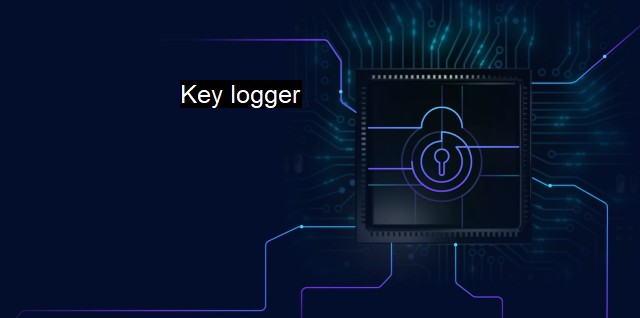What is Key logger?
The Danger Within: Understanding Key Loggers and How to Protect Against Them
A "Keylogger", short for keystroke logger, is a term widely used in the field of cybersecurity and antivirus industry for software or hardware designed to record every keystroke users make on their computers. Therefore, they can stealthily glean sensitive data from users such as login credentials, credit card numbers, or other forms of personal information. This nefarious tool serves as the linchpin for certain malicious entities, such as hackers or unethical companies, to violate privacy rights or commit various types of fraud.A keylogger operates by intercepting and recording inputs from the user's keyboard to a log file either on the same computer or a predefined remote location. These log files can thus reveal encrypted passwords, conversations, credit card information, and other sensitive data. Alarmingly, this is done without users' approval, and in most cases, without them noticing until it is too late. They may be introduced to the user's machine via various mediums such as email attachments, malicious websites, software downloads, or even physical access to the computer.
In the spectrum of keyloggers, two types exist – hardware and software keyloggers.
A hardware keylogger is a small physical device plugged into the computer between the keyboard and the computer. It records the keystrokes and saves them within its internal memory. The benefit of this type is it not reliant on the computer's operating system and catches keystrokes before the system processes them. their drawback is the physical accessibility requirements for retrieval or installation, making them less popular among cybercriminals.
In contrast, a software keylogger is a program installed on a targeted device and records individual keystrokes. This type of keylogger is more sophisticated and complex, owing to their stealthiness and diverse capabilities. For instance, some software keyloggers can capture screenshots, record audio from the microphone, intercept data from web forms, or manipulate applications.
Alarmingly, such keylogger software is widely available online, even marketed as legitimate business tools for employers to monitor employees' computer activities or parents who want to keep tabs on their children's online behavior.
In spite of their ostensible applications, the fact remains that keyloggers are mostly used for malicious purposes. With the ascendant proliferation of Internet users and digital transactions, the opportunities for unwarranted surveillance through keyloggers have skyrocketed. They enable perpetrators to engage in identity theft, banking fraud, espionage, blackmail, or intellectual property theft.
Recognizing the prolific threats of keyloggers, the cybersecurity and antivirus industry has been consigning resources and innovations to combat the menace. Antivirus solutions, computer security packages, encrypted communication channels, firewalls – these integral aspects of network security serve as formidable citadels against the bane of keyloggers.
Many advanced antivirus software now include a keylogger detector component. Through techniques such as behavioral analysis, signature detection, heuristics, sandboxing amongst others, these tools can identify the modus operandi of a keylogger and neutralize its effect expediently. Some secure web browsers offer keystroke encryption functionality, preventing the software keyloggers from intercepting the users' inputs.
Implementing multi-factor authentication (MFA) and biometric authentication also provide a solid line of defense against keyloggers. These verification methods transcend the ubiquitous reliance on password inputs, thereby nullifying the keylogger's main mode of operation.
While technical defenses play a crucial role in mitigating the risks of keyloggers, raising awareness among users about this egregious threat and fostering prudent cyber-hygiene habits – such as not opening suspicious emails or downloads, keeping systems and antivirus software up-to-date, or regularly changing passwords and using a password manager – are invaluable measures to bolster cybersecurity posture against the menace of keyloggers.

Key logger FAQs
What is a keylogger?
A keylogger is a type of software that records every keystroke made on a computer or device. This includes login credentials, personal information, and sensitive data.Is keylogger illegal?
It depends on how it is used. If it is used for malicious purposes, such as stealing personal information, then it is illegal. However, some companies and organizations use keyloggers for legitimate purposes, such as monitoring employee activity.How can I protect myself from keyloggers?
One way to protect yourself from keyloggers is to use antivirus software that includes anti-keylogger protection. Additionally, be cautious about downloading and installing software from untrusted sources, and always keep your operating system and software up to date with the latest security patches.Can antivirus detect keyloggers?
Yes, most antivirus software includes keylogger detection as part of their malware scanning capabilities. However, it is important to keep in mind that not all keyloggers are detected by antivirus software, so it is still important to be cautious and protect your devices.| | A | | | B | | | C | | | D | | | E | | | F | | | G | | | H | | | I | | | J | | | K | | | L | | | M | |
| | N | | | O | | | P | | | Q | | | R | | | S | | | T | | | U | | | V | | | W | | | X | | | Y | | | Z | |
| | 1 | | | 2 | | | 3 | | | 4 | | | 7 | | | 8 | | |||||||